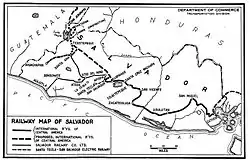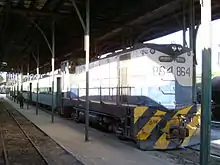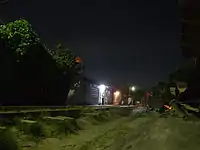Rail transport in El Salvador
At present (2020), no trains are operated in El Salvador. The national railroad corporation is FENADESAL (Ferrocarriles Nacionales de El Salvador), a division of CEPA (Comisión Ejecutiva Portuaria Autónoma, port authority). It oversees 554.8 km of all disused 3 ft (914 mm) narrow gauge lines connecting major cities (San Salvador, Santa Ana, Acajutla, Sonsonate, Soyapango, Zacatecoluca) and formerly linked with Guatemala railroads at Anguiatú.[1]
History

The first railroad in El Salvador was opened between Sonsonate and the port of Acajutla on June 4, 1882. In the following years, the lines extended to Santa Ana, San Salvador and other places. Parts of network were managed separately by The Salvador Railway Company Limited (later nationalized and renamed FES - Ferrocarril de El Salvador) and IRCA - International Railways of Central America (a United Fruit company, later nationalized and renamed FENASAL - Ferrocarril Nacional de El Salvador). In 1975, based on a governmental decree, the two companies merged into FENADESAL - Ferrocarriles Nacionales de El Salvador, managed and administered by CEPA (port authority) on behalf of the state.[2]
All rail transport was suspended in October 2002. Passenger trains between San Salvador and Soyapango were briefly restored from October 2004 until April 2005 to help alleviate traffic congestion after a collapse of a road bridge which connected these two cities.[3]
In 2006 CEPA presented a pilot scheme for reviving the rail network. Commuter services could be introduced between San Salvador and Apopa, requiring the refurbishment of seven passenger vehicles.[4]
In November 2007 the CEPA plan was put into effect and the service to Apopa was restarted with two return trips each morning and evening aimed at commuter traffic. The fare is on 10¢ US for the 12 km trip, and to ensure safety four police officers ride each train (service suspended from 2013). The plan is to reopen the whole route to the provincial capital of Sonsonate in stages over the next 12 months with the next stage to Nejapa due to reopen in March.
References
- Rehabilitation in progress Archived 2010-03-06 at the Wayback Machine
- FENADESAL site Archived 2007-03-12 at the Wayback Machine
- FENADESAL site Archived 2006-10-20 at the Wayback Machine
- "Pointers". Railway Gazette International. 2007-01-01.
External links
| Wikimedia Commons has media related to Rail transport in El Salvador. |

.JPG.webp)
